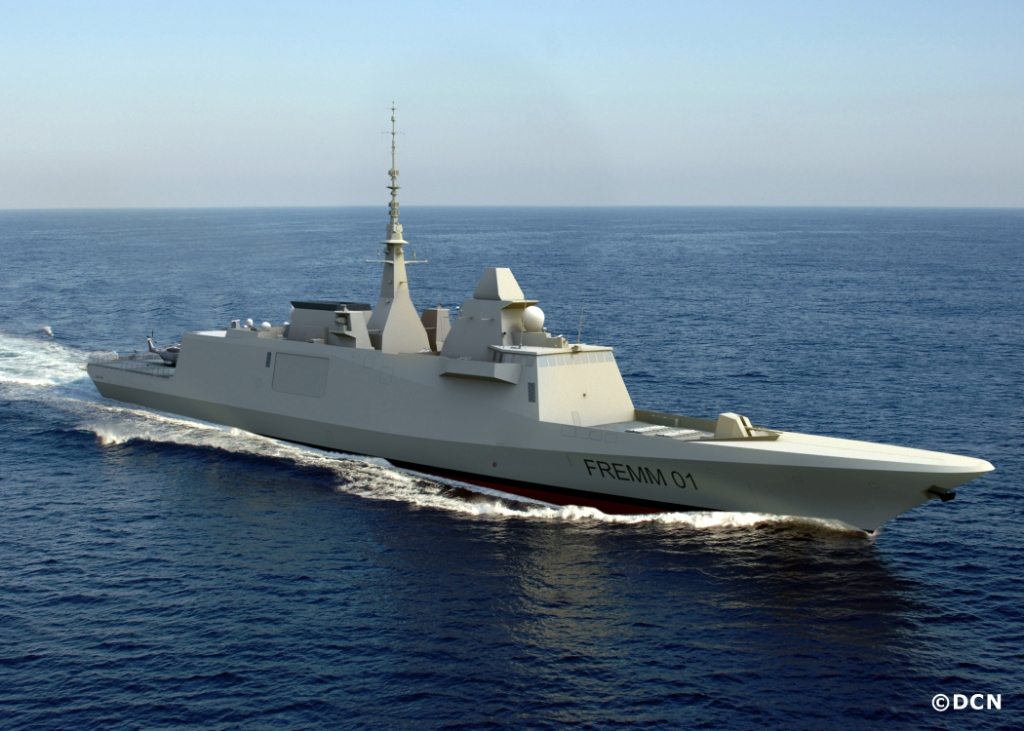The FREMM frigate built for the Royal Moroccan Navy put to sea for the first time on 17 April. This key milestone marks the launch of sea trials, which will be conducted over the next few weeks off the Brittany coast. The ship will be delivered to the Royal Moroccan Navy at the end of this year, in accordance with the contract schedule.
During this first period at sea, the crew made up of French Navy personnel, customer representatives and DCNS employees will focus primarily on the performance of the ship’s propulsion system and navigation system. The exceptional seakeeping qualities of the FREMM frigates have already been demonstrated by the first-of-class Aquitaine, delivered to the French Navy in November 2012.
“This milestone is the culmination of a remarkable team effort by DCNS, our partners and suppliers, the trials crew and customer representatives,” said Anne Bianchi, director of FREMM frigate programmes at DCNS. “The FREMM frigates are designed and built by DCNS to meet the needs of many navies around the world, as demonstrated by this first export sale to Morocco. They are among the most technologically advanced and competitively priced vessels on the world market, and are inherently versatile to provide a response to all types of threats. They offer a range of innovative features and unparalleled levels of interoperability and operational readiness.”
The teams on board will work day and night to conduct a series of tests at a sustained pace. The first three days of the campaign, known as the ‘familiarisation’ phase, will be used to test the vessel’s safety systems and equipment, including fire-fighting, flood control and emergency response systems and evacuation procedures as well as manoeuvrability and mooring performance.
The second phase will focus on the propulsion system. The FREMM’s high-performance hybrid CODLOG (COmbined Diesel eLectric Or Gas) power package combines electric motors for low-speed silent-mode propulsion and a gas turbine for high-speed mechanical propulsion, with a maximum speed in excess of 27 knots.
In addition, the DCNS teams will also test the ship’s navigation systems (log, position, heading) and its inertial platforms for precise positioning anywhere in the world.
In the next few weeks, over 150 people, including 60 French Navy personnel, will spend time on this second FREMM frigate. To save the ship returning to port, people will be ferried out and back on a daily basis.
On completing these preliminary trials, the frigate will return to DCNS’s Lorient shipyard for several days of quayside work. A few weeks later, it will put to sea for a second campaign of trials focusing on the combat system.
Royal Moroccan Navy crew training underway
While these first sea trials are taking place, some of the Royal Moroccan Navy personnel who will crew the new vessel are beginning simulator-based training at DCNS’s Lorient facility to familiarise themselves with the vessel and its systems. This training programme will be ramped up over the next few months as further members of the future crew arrive.
FREMM, a major programme for DCNS and its partners
The FREMM programme includes 12 ships, 11 for the French Navy and one for the Royal Moroccan Navy.
In November 2012, DCNS successfully delivered the FREMM frigate Aquitaine, the first-in-class of the new FREMM multimission frigates.
The second vessel of the programme will be delivered to the Royal Moroccan Navy before the end of 2013, in line with contractual agreements, and will be named Mohammed VI.
Four other FREMM multimission frigates are at various stages of completion at DCNS’s Lorient shipyard:
- Normandie, the third in the series, will begin sea trials at the end of the year and will be delivered to the French Navy in 2014.
- Provence is now fully built and will be floated out of the building dock in the fourth quarter of 2013.
- The fifth and sixth of the series are under construction.
FREMM technical data
The FREMM frigates are heavily armed warships built under DCNS prime contractorship to carry state-of-the-art weapons and systems including the Herakles multifunction radar, MdCN cruise missiles, Aster anti-air missiles, Exocet MM40 anti-ship missiles and MU90 torpedoes.
- Length overall: 142 metres
- Beam: 20 metres
- Displacement (approx.): 6,000 tonnes
- Max. speed: 27 knots
- Complement: 108 (including helicopter crew)
- Accommodation: 145 men and women
- Range: 6,000 nm (at 15 knots)
DCNS is a world leader in naval defence and an innovative player in energy. Its leadership is built on a proven ability to meet customer needs by combining exceptional know-how with unique industrial resources. DCNS designs, builds and supports submarines and surface combatants. It also proposes services for naval shipyards and bases. The DCNS Group employs 13,200 people and generates annual revenues of €2.9 billion.










